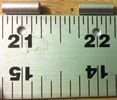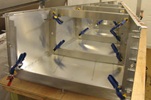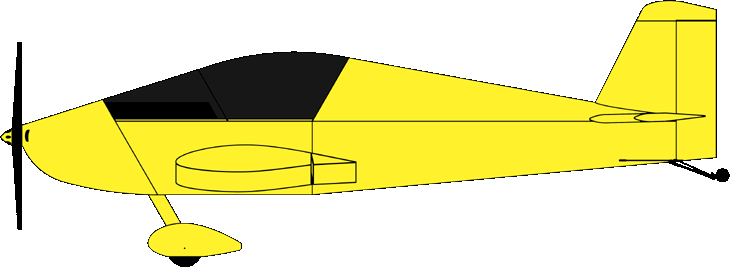


random user submitted photo
Ring Terminals
14 posts
• Page 2 of 2 • 1, 2
Re: Ring Terminals
builderflyer wrote:Bryan Cotton wrote:
No one should deny that a soldered connection is potentially electrically better than a crimped connection, especially over the long term. But when a "business" situation is involved, the cost benefit ratio sometimes reigns supreme. The "fatigue" issue is easily dealt with but with the additional time spent "soldering" and "supporting", the added cost is likely prohibitive.
Art,,,,,,,,,,,,,,Sonex taildragger #3300,,,,,,,,,,,,,,Jabiru 3300 #261
I won't deny it, especially with the qualifier "potentially". But we were not using crimp connectors for cost. Every connector, all the wire, all the calibrated tools and labor are eye-wateringly expensive. Connector pins were generally gold plated crimp type. They are also expected to survive salt environments. Helicopters do shake a lot and soldered wires will also break at the end of the solder joint. Lots more 38999 connectors than lugs in a Blackhawk.
Bryan Cotton
Poplar Grove, IL C77
Waiex 191 N191YX
Taildragger, Aerovee, acro ailerons
dual sticks with sport trainer controls
Prebuilt spars and machined angle kit
Year 2 flying and approaching 200 hours December 23
Poplar Grove, IL C77
Waiex 191 N191YX
Taildragger, Aerovee, acro ailerons
dual sticks with sport trainer controls
Prebuilt spars and machined angle kit
Year 2 flying and approaching 200 hours December 23
-

Bryan Cotton - Posts: 5034
- Joined: Mon Jul 01, 2013 9:54 pm
- Location: C77
Re: Ring Terminals
Soldered Connections
Sure solder creates an excellent electrical connection BUT it has a down side:-
Many years ago, I spent some time at a marine research station. When I installed radios in some of the boats, I soldered all the electrical connections. Can't recall exactly how long the soldered connections lasted but I reckon within a month, there were connection problems. When I investigated, the solder had completely disappeared from most joints.
It wasn't just my electrical work that suffered - pretty much anything with dissimilar metals went the same way, sooner or later.
Electrolysis only needs moisture and dissimilar metals to take hold. Salt just accelerates the process.
The moral of the story - if your aircraft "lives" in a salt laden atmosphere (near the sea) soldered connections are pretty much a waste of effort.
Except in special circumstances, I gave up on soldering connection from that time on - all crimp style for me and have never had a problem since.
For those who may be concerned with achieving the best electrical connection - use washers and a smear of dielectric grease on mating surfaces and make sure the connection is tight.
Sure solder creates an excellent electrical connection BUT it has a down side:-
Many years ago, I spent some time at a marine research station. When I installed radios in some of the boats, I soldered all the electrical connections. Can't recall exactly how long the soldered connections lasted but I reckon within a month, there were connection problems. When I investigated, the solder had completely disappeared from most joints.
It wasn't just my electrical work that suffered - pretty much anything with dissimilar metals went the same way, sooner or later.
Electrolysis only needs moisture and dissimilar metals to take hold. Salt just accelerates the process.
The moral of the story - if your aircraft "lives" in a salt laden atmosphere (near the sea) soldered connections are pretty much a waste of effort.
Except in special circumstances, I gave up on soldering connection from that time on - all crimp style for me and have never had a problem since.
For those who may be concerned with achieving the best electrical connection - use washers and a smear of dielectric grease on mating surfaces and make sure the connection is tight.
- Skippydiesel
- Posts: 633
- Joined: Tue Jul 06, 2021 6:24 am
Re: Ring Terminals
[quote="Skippydiesel"]Soldered Connections
Sure solder creates an excellent electrical connection BUT it has a down side:-
The moral of the story - if your aircraft "lives" in a salt laden atmosphere (near the sea) soldered connections are pretty much a waste of effort.]
Google this topic and you'll find hundreds of varied opinions on both sides of the argument. But in your situation, where the soldered connections went bad in a very short time, I'm guessing that you may have inadvertently used acid core solder rather than rosin core solder. Otherwise, it defies explanation as to how the connections could have gone bad so quickly.
For over ten years my Sonex was based on an airport with a daily sea breeze from the Pacific ocean and the soldered connections I used remained as pristine as the day they were first soldered. And they remain so now more than twenty years after first being soldered. Just my opinion, but based on fact.
Art,,,,,,,,,,,,,,,,,Sonex taildragger #95,,,,,,,,,,,,,,,,,Jabiru 3300 #261
Sure solder creates an excellent electrical connection BUT it has a down side:-
The moral of the story - if your aircraft "lives" in a salt laden atmosphere (near the sea) soldered connections are pretty much a waste of effort.]
Google this topic and you'll find hundreds of varied opinions on both sides of the argument. But in your situation, where the soldered connections went bad in a very short time, I'm guessing that you may have inadvertently used acid core solder rather than rosin core solder. Otherwise, it defies explanation as to how the connections could have gone bad so quickly.
For over ten years my Sonex was based on an airport with a daily sea breeze from the Pacific ocean and the soldered connections I used remained as pristine as the day they were first soldered. And they remain so now more than twenty years after first being soldered. Just my opinion, but based on fact.
Art,,,,,,,,,,,,,,,,,Sonex taildragger #95,,,,,,,,,,,,,,,,,Jabiru 3300 #261
- builderflyer
- Posts: 422
- Joined: Sat Jul 09, 2016 12:13 pm
Re: Ring Terminals
Thanks for that Builderflyer,
I have no recollection of the type of solder used - would have been something purchased through the local parts store, without consideration as to the flux type.
Have to point out though, that our corrosion/electroless problems in all aspects of the facility were huge. Our mains electrical supply (240V), pumps, metal structures/equipment, even our aluminium boat hulls, etc suffered from corrosion. Any metal in close proximity to a dissimilar metal, seemed to just dissolve, especially so, where an electrical current was also involved.
Bear in mind that my 2 year experience, in a marine research facility, was about 20 years ago now - they likely have better understanding of electrolysis and have implemented a whole range of control systems/materials/techniques, by now.
Just my observation, but based on fact.:)
I have no recollection of the type of solder used - would have been something purchased through the local parts store, without consideration as to the flux type.
Have to point out though, that our corrosion/electroless problems in all aspects of the facility were huge. Our mains electrical supply (240V), pumps, metal structures/equipment, even our aluminium boat hulls, etc suffered from corrosion. Any metal in close proximity to a dissimilar metal, seemed to just dissolve, especially so, where an electrical current was also involved.
Bear in mind that my 2 year experience, in a marine research facility, was about 20 years ago now - they likely have better understanding of electrolysis and have implemented a whole range of control systems/materials/techniques, by now.
Just my observation, but based on fact.:)
- Skippydiesel
- Posts: 633
- Joined: Tue Jul 06, 2021 6:24 am
14 posts
• Page 2 of 2 • 1, 2
Who is online
Users browsing this forum: No registered users and 17 guests







